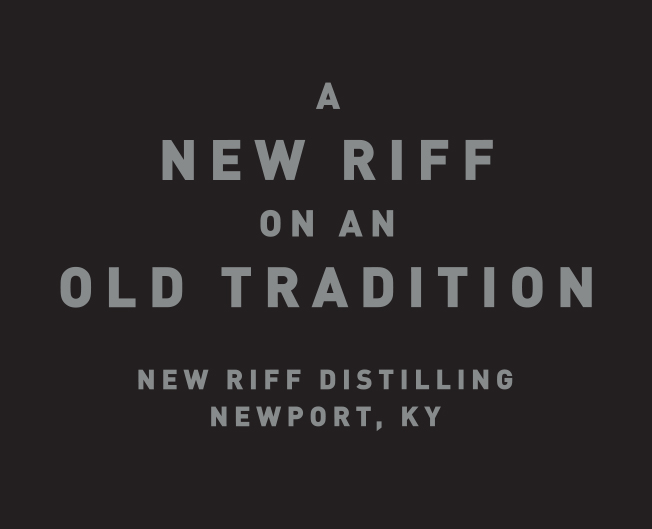A New Riff on Grains
If the question of our water supply was, quite properly, the first thing we addressed in creating
New Riff, the second issue was our grain supply. We knew from early on that we wanted to be a
rye-centric distillery, with a great fondness for this spicy grain, and featuring high rye Bourbon
recipes. We committed to working with, to the extent possible, local Ohio Valley grain sources.
But we also sought to leverage relationships inside the Bourbon industry and work with the top
suppliers in the field (which was especially important for a high rye mashbill). One overlooked
component of this is the fact that our grain handling facilities are large enough to work in full
tractor-trailer shipments, about 50,000 pounds of grain per load. Many smaller distilleries are
forced to work in smaller increments—and some of them can’t grind their own grains, requiring
that the grains be ground before delivery—both of which limit what they can work with. We
also have in our grain handling equipment the ability to inject any grain into the mill and thus
into our whiskey mashes, using our auxiliary grain dump and conveyor. Between the 50,000
pound silos, and the auxiliary conveyor which can take a mere 50-pound bag, we enjoy the
advantages of both the large and small distillery model.
Our Mashbills
High Rye Bourbon
Our commitment to genuinely high rye Bourbon starts with this 65% corn, 30% rye, 5% malted
barley mashbill. At double the rye content typical across the industry, this is a definitive high
rye Bourbon.
95/5 Rye
We learned the dark magic of the diabolically difficult 95% rye mashbill from the man who
invented and mastered it: our consultant in building New Riff, Master Distiller Larry Ebersold of
Seagram’s Indiana. We took Larry’s instruction and put a new riff on it with 5% malted rye, a
delicious change-up that injects a bit more elegance into the whiskey.
100% Malted Rye
Finally, the third whiskey we distill every month (after New Riff Bourbon and Rye) is a rare 100% malted rye mash bill. One of our mentors, Mr. Ebersold, inspired us to try a 100% malted rye, saying it was the best whiskey he ever made. We got to work at once making a batch of the
stuff, and the first juice trickled off the still in December 2014. Released in the spring of 2021,
this extraordinary six-year-old malted rye sits like a crown on top of our standard portfolio.
About Our Grains
Meet Charles Fogg, Farmer
Our primary farmer is Charles Fogg (what a name for a farmer!), based in Greensburg, Indiana.
He delivered our first truckload of corn in June 2014 and has done so for every delivery since.
We think he’s the best in the business. Mr. Fogg supplies us with non-genetically modified corn
(about which more in a moment), including a genetic analysis with each shipment for
verification. More important, he was trained in whiskey grain quality control methods by none
other than ex-Seagram’s quality control department. For starters, this means the grain is
cleaned.
Clean, Clean, Clean
To clean a grain, you put the harvested, shucked, dried grains onto a screen, a large screen
perhaps the size of a car. The screen has holes that are larger than the grain. The screen is
vigorously shaken back and forth, and the corn falls through the screen onto another screen.
Thus, debris and particles which are larger than the grain (such as sticks and stalks and cobs)
remains on the screen. The second screen has holes smaller than the corn, so when you shake
that screen, smaller particles such as rocks and dirt or non-corn seeds fall through. What’s left
is totally pure grain. At New Riff, we use exclusively well-cleaned grain, which adds a cost to the process. Many distillers (at the behest of their corporate beancounters) do not take this extra
step. The result is a clarity of flavor in the whiskey, as well as superior control during the
fermentation.
The rest of Charles Fogg’s quality control regimen consists of running checks for moisture,
genetics, foreign matter, and perhaps most important, an organoleptic test that examines each
batch for any moldy off-flavors. That Mr. Fogg and his team are trained in these methods by ex-
Seagram’s personnel is a very rare skill to find in a farmer. While Charles’ primary business
consists of custom feeds for livestock and pets, it is unique that he is also trained in how to
produce the best possible corn for distillation. We do the same QC checks here at New Riff on
every batch, but having that kind of commitment from a farmer is incredible and invaluable.
We’ve never had to reject a load of grain from Charles Fogg.
Tune in next month for an in-depth look at our different grains—including our commitment to
American heirloom varieties.
